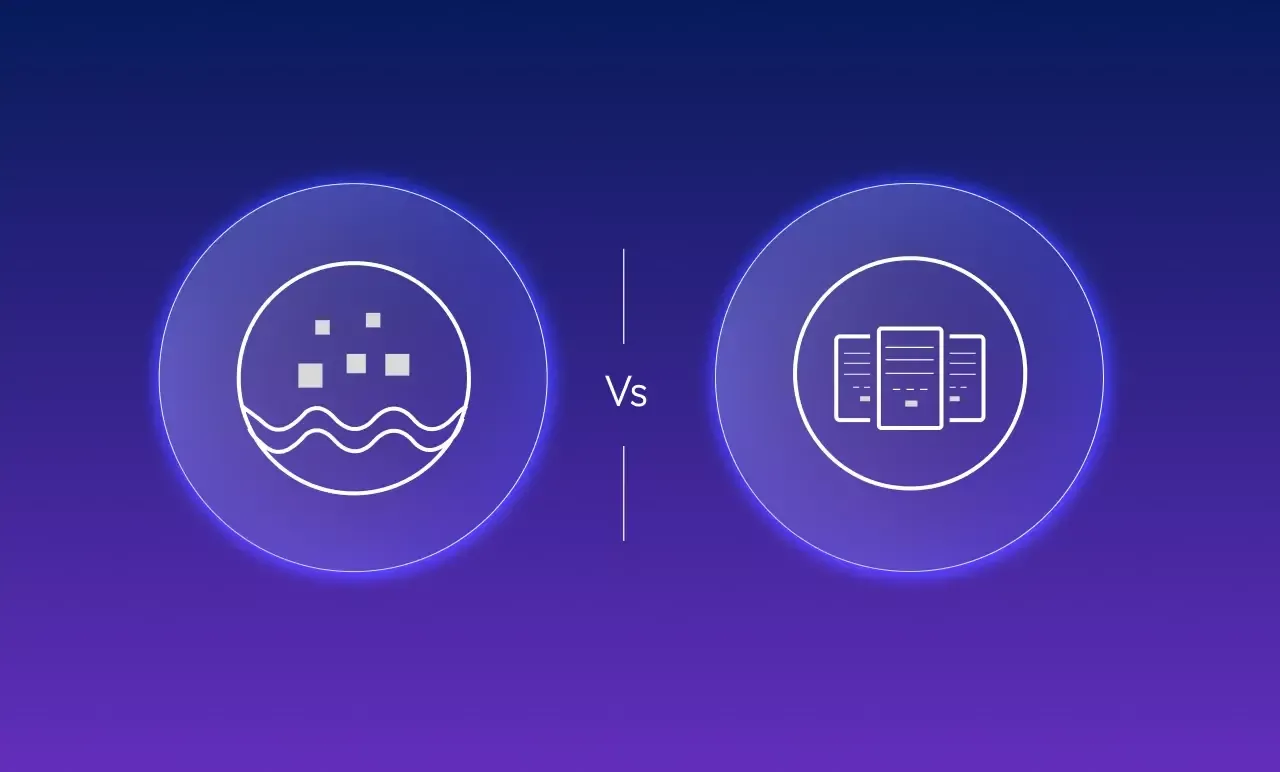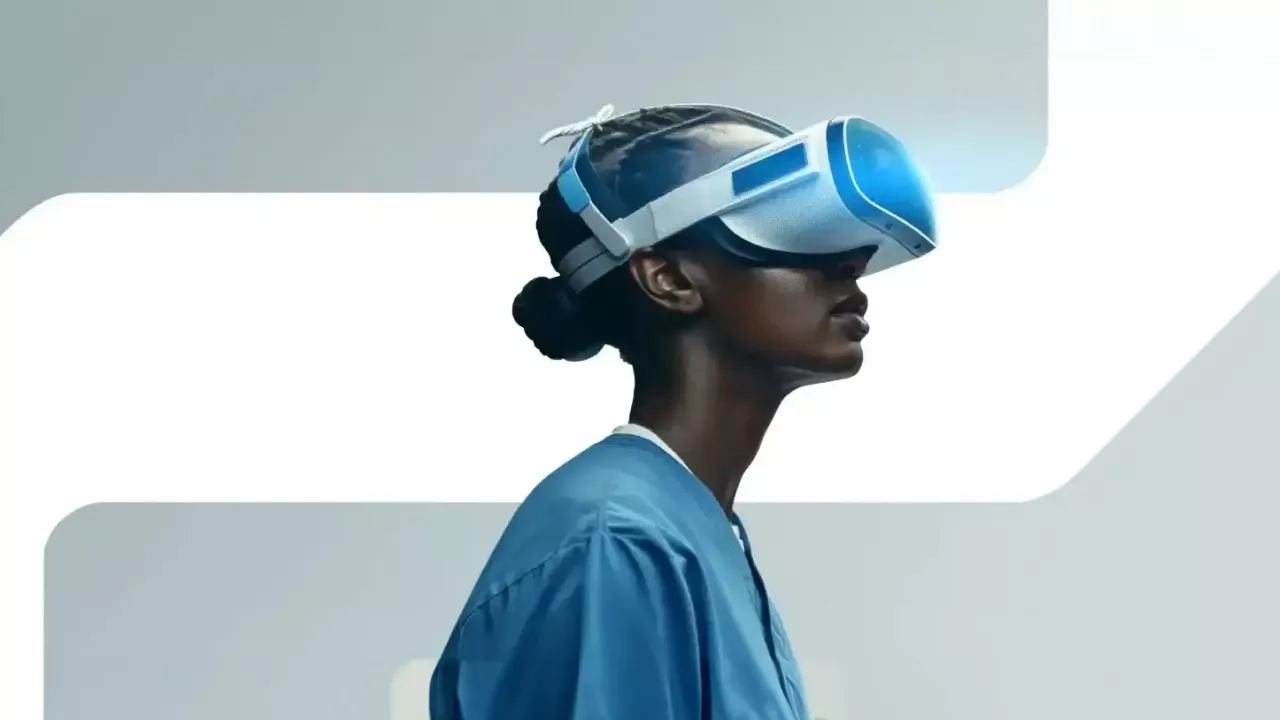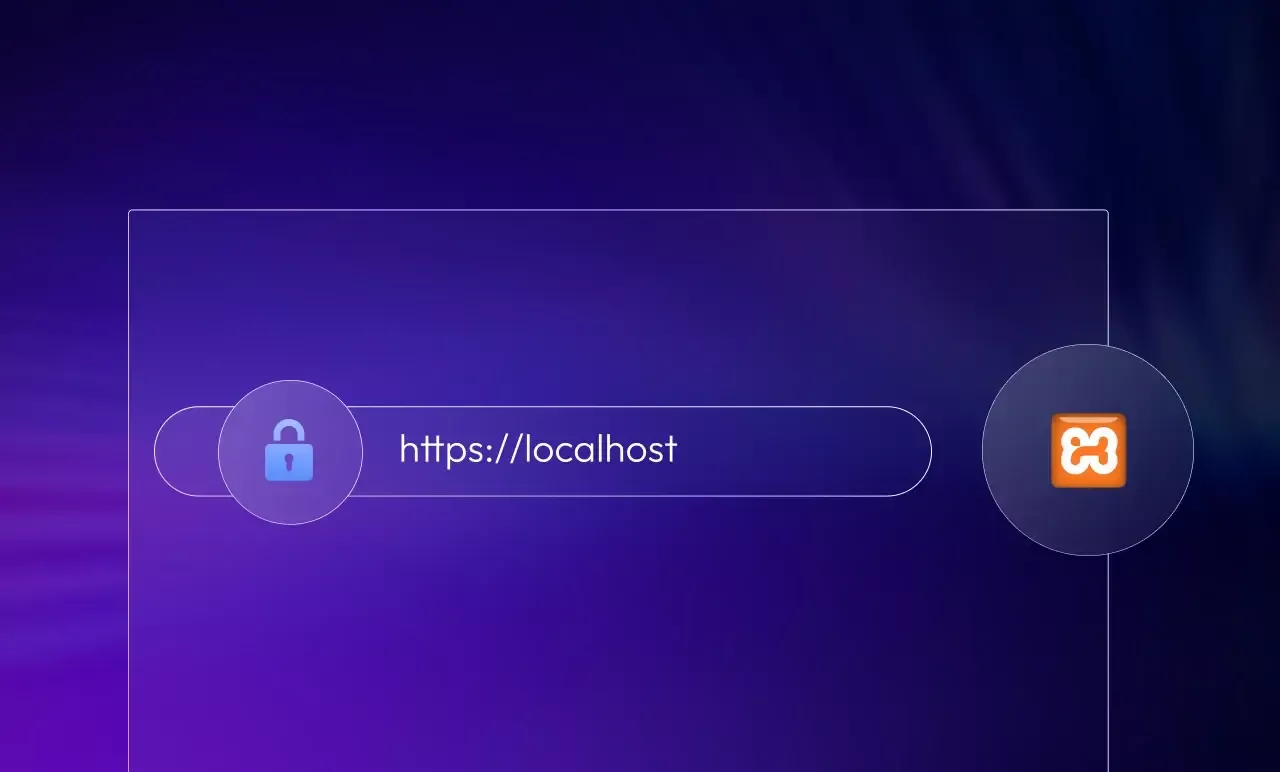Data Storage Decoded: Data Warehouse vs Data Lake Explained
Generative AI in Healthcare: A New Era for Patient Care
The concept of AI is not new and has already been used to predict outcomes and detect diseases earlier. However, generative AI in healthcare introduces a new layer of capability.
Generative AI is creating a lot of buzz in healthcare, and it’s easy to see why.
It is reshaping healthcare by enhancing both diagnosis and treatment. In the meantime, it is also helping destress the healthcare system, making services more personalized and efficient.
The Potential Of Generative AI in Healthcare
Generative AI shows strong potential in addressing key healthcare challenges such as administrative burdens, diagnostic delays, and limited personalization.
Its effectiveness is most evident in low-risk, repetitive tasks, where it can safely learn from historical data to identify patterns and support decision-making. As the technology matures, its ability to streamline workflows, generate insights, and enhance care delivery becomes increasingly evident.
These capabilities are now being translated into real-world use cases that improve efficiency and patient outcomes.
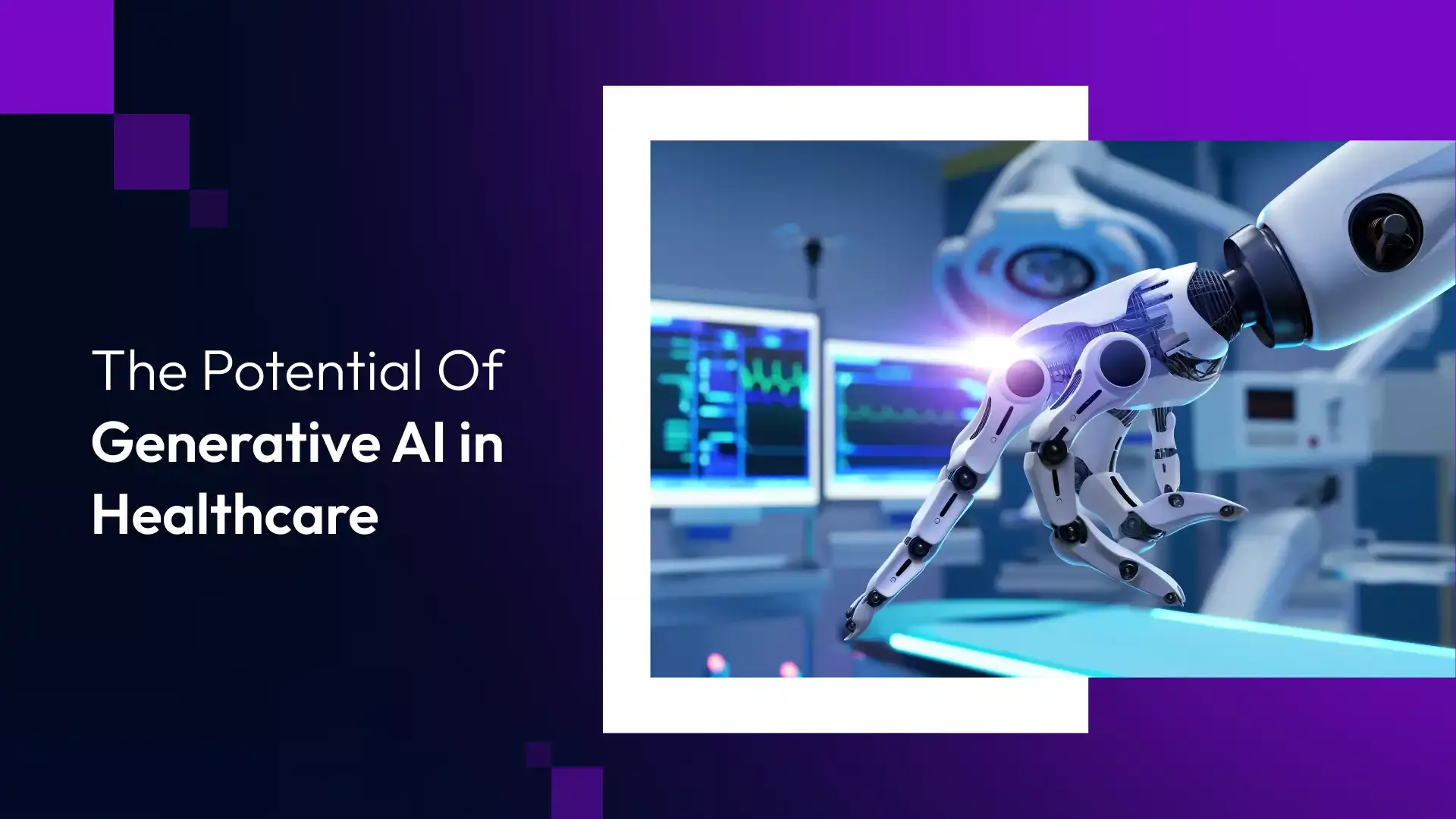
Challenges that can be solved by Generative AI in Healthcare Industry
The healthcare sector is under immense pressure, grappling with major issues like:
- Workflow Inefficiencies and Resource Shortages: Outdated processes and limited availability of staff and equipment lead to bottlenecks in care delivery.
- Clinician Burnout: Long hours, administrative burdens, and high-stress environments are leading to increased mental and physical exhaustion among medical staff.
- Worsening Health Outcomes: Delays in diagnosis, fragmented care, and lack of personalization are contributing to suboptimal patient outcomes.
- Workforce Training and Interoperability Issues: The rapid pace of technological change makes it difficult to keep staff adequately trained, while disconnected systems hinder smooth data exchange.
- Data Security and Regulatory Compliance: Protecting sensitive patient data while adhering to complex regulations remains a persistent challenge for healthcare institutions.
- High Operational Costs and Low Profit Margins: Administrative overhead, redundant processes, and poor resource allocation contribute to unsustainable cost structures. Plus, rising costs and inefficiencies across systems are eroding profitability for healthcare organizations, especially smaller providers.
These issues are especially observed in underserved areas and call for a renewed commitment to genuine care and trust in healthcare practices.
Use Cases of Generative AI in Healthcare Industry
So, how can Generative AI make a difference?
While natural language processing (NLP) and machine learning (ML) have already made strides in healthcare, generative AI takes these to the next level.
Here are some of the most practical applications of generative AI in healthcare today that are making the cut for a new era of patient care.
Accurate and Faster Diagnoses
AI models can sift through massive amounts of medical data. This can uncover patterns and anomalies that human clinicians may overlook.
In radiology, this technology excels at detecting tumors, fractures, and infections with impressive accuracy. This facilitates providing faster and more reliable diagnoses.
Generative AI in healthcare diagnostics is also advancing the field of medical imaging. It can enhance image quality and resolution by processing large datasets of radiological images. This can create highly detailed, high-fidelity visuals that enable more precise diagnoses and earlier detection of medical conditions. This will ultimately improve overall patient care.
Advancing Disease Prediction and Prevention with Generative AI
Generative AI models can assess the likelihood of specific conditions developing by leveraging a wide range of patient data. This encompasses genetic profiles to lifestyle choices. With this advanced forecasting, doctors can intervene earlier.
Taking preventive measures can help reduce or even prevent the onset of diseases. This can ultimately help patients avoid or delay the onset of diseases and improve their overall health trajectory.
Accurate Drug Development
Instead of the traditional, lengthy development timelines, pharmaceutical companies can now use AI to predict, simulate, and optimize drug candidates with remarkable speed and precision.
Here’s how:
- Predictive Compound Analysis: AI models can rapidly predict how compounds will interact with biological targets, significantly reducing the need for time-consuming laboratory testing.
- Novel Drug Candidate Generation: Generative AI helps design entirely new chemical compounds and molecular structures by identifying hidden patterns in disease markers.
- Accelerated Screening and Safety Testing: These transformative technologies allow faster identification of viable drug candidates. At the same time, it simulates potential side effects, interactions, and safety risks, cutting down early-stage development timelines.
- Faster Market Access with Personalized Medicine: AI in personalized medicine is transforming drug development for complex diseases like Alzheimer’s and Parkinson’s. It does so by forecasting effective molecular structures and streamlining the entire discovery pipeline, making AI-powered medical treatment more accessible and faster.
A real-world breakthrough example is Insilico Medicine’s AI-designed drug, INS018_055. It is developed to treat idiopathic pulmonary fibrosis and has already entered human clinical trials.
More Efficient Clinical Trials
Generative AI is transforming clinical trials by accelerating processes, improving accuracy, and enhancing predictive capabilities. By analyzing vast patient datasets and medical records, AI-driven systems generate real-time insights that support more precise diagnoses and tailored AI-powered medical treatment plans with:
- Data-Driven Patient Simulation: AI models are trained on massive datasets, from past clinical trials to real-world case studies, allowing them to generate digital twins of patients. These simulated representations help researchers test various hypotheses without needing large physical cohorts.
- Forecasting Disease Progression: Generative models can predict how a participant’s condition might evolve without the experimental treatment. This counterfactual forecasting provides a robust control scenario, which is especially valuable in trials with limited participants.
- Enhanced Trial Confidence: By simulating untreated outcomes, AI increases confidence in results from small-scale or early-phase trials. This leads to better decision-making about whether to advance a treatment to larger phases.
- Iterative Learning and Optimization: Just like other machine learning models, generative AI goes through an iterative training process—repeatedly feeding data through algorithms until the model reliably performs tasks like outcome prediction or patient matching.
- Faster Hypothesis Testing: Researchers can use AI-generated patient profiles to quickly test multiple trial scenarios virtually, reducing the time and resources spent on designing and executing real-world trials.
- Reduction in Placebo Use: With digital twins simulating untreated outcomes, there's potential to minimize the number of patients assigned to placebo groups, making trials more ethical and appealing to participants.
Personalized Treatment Plans
By analyzing a patient's genetic information, medical history, and lifestyle factors, AI can create customized treatment plans that are tailored to the individual. This precision helps maximize the effectiveness of treatments while minimizing potential side effects.
Generative AI in healthcare is particularly impactful in fields like oncology. It can design targeted therapies based on a comprehensive analysis of patient data. This, as a result, will lead to more effective cancer treatments with fewer side effects.
This shift towards personalized care is bringing digital transformation in healthcare by changing how treatments are developed and delivered. It's a great way to ensure each patient receives the most suitable and effective interventions.
Advanced Patient Monitoring
AI is transforming patient monitoring by offering continuous, real-time analysis of lab data and patient vitals.
Wearable devices powered by AI can instantly detect irregularities and notify healthcare providers. This allows for swift, proactive interventions and enhances patient care. Catching potential health issues early and ensuring that medical teams can respond promptly will prevent complications and improve overall outcomes.
Robotic Surgery with AI Assistance
With AI’s ability to process and interpret vast amounts of data instantly, it supports surgeons in making critical decisions. This ensures greater accuracy and minimizes the margin for error.
This AI assistance allows for more delicate and minimally invasive surgeries. Its result is a reduction in patient recovery times and a lower risk of complications. Combining human expertise with AI-driven technology, robotic surgery delivers reliability, safety, and efficiency. As a result, patients can enjoy improved outcomes and faster healing. Integrating robotic processes in surgery is making even the most complex operations more manageable and effective.
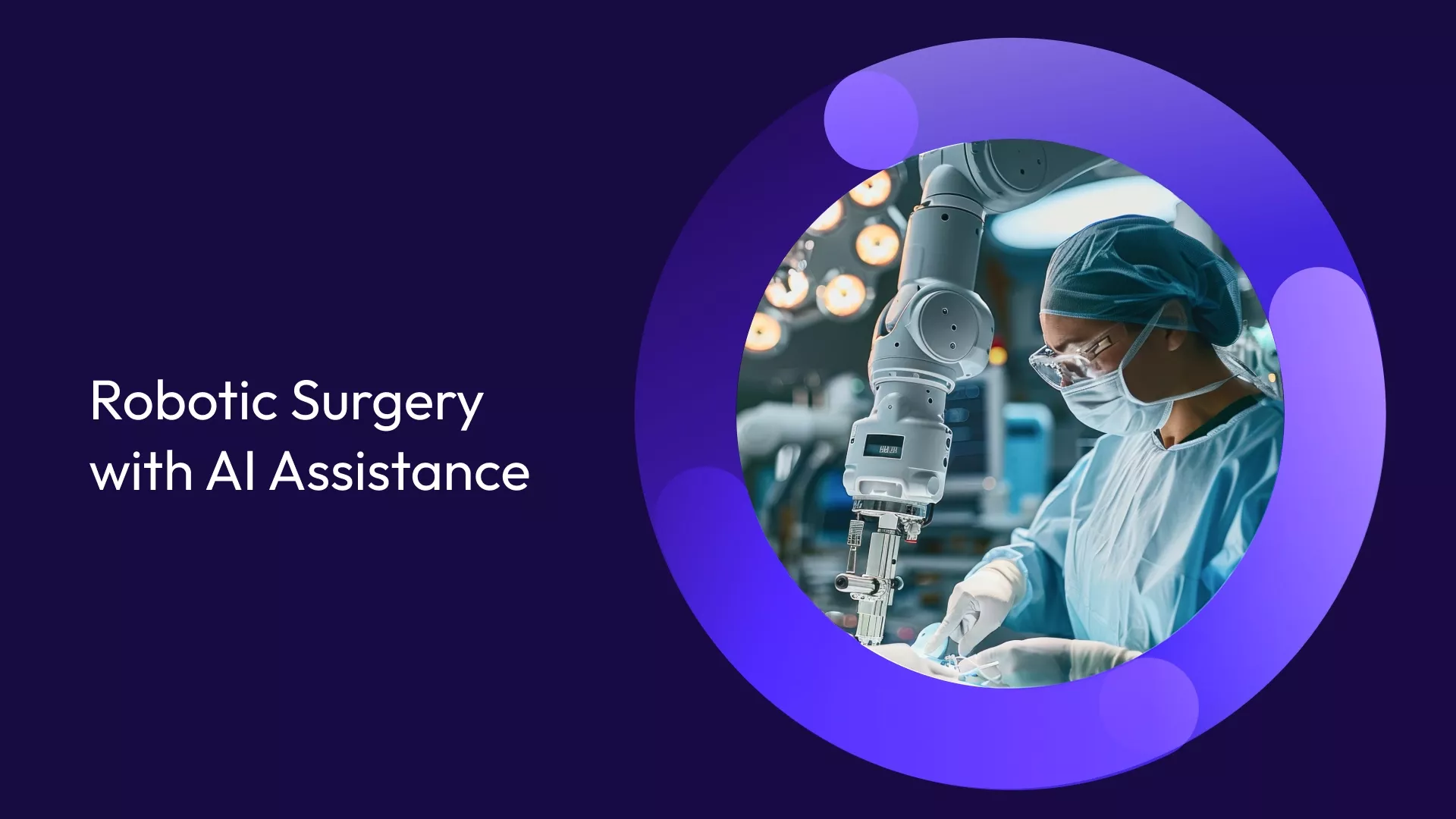
Customer Service and Experience
Delivering a seamless and personalized patient experience is a growing priority in modern healthcare. With AI-powered tools, healthcare providers are enhancing customer service touchpoints, from initial contact to post-care follow-ups.
Here’s how:
- Digital Frontdoor for Self-Service: AI-powered virtual assistants and chatbots serve as the first point of contact, enabling patients to schedule appointments, check symptoms, find answers to common questions, and navigate healthcare services, quickly and independently.
- In-Hospital Engagement: Within hospitals, AI enhances real-time engagement through tools like smart kiosks, bedside devices, and healthcare mobile apps. These solutions offer wayfinding support, multilingual assistance, and personalized health tips.
- Contact Center Co-Pilot: AI acts as a real-time assistant for support agents by providing response suggestions, summarizing patient queries, and automating documentation. This leads to faster resolutions, improved consistency in communication, and a more efficient contact center experience for both patients and staff.
Audit and Compliance
In a highly regulated industry like healthcare, maintaining compliance and conducting thorough audits is critical, but often complex and time-consuming. AI introduces automation, intelligence, and foresight to streamline the entire audit and compliance lifecycle.
- Proactive Compliance Monitoring: AI continuously scans operational, clinical, and administrative data to detect inconsistencies or deviations from regulatory norms. This allows organizations to uncover compliance gaps early, minimizing risk and maintaining audit readiness.
- Intelligent Risk Detection: Predictive AI models raise preventive alerts for actions or trends that may lead to violations. These early warnings empower teams to act swiftly, correcting courses before issues become full-blown compliance failures.
- AI-Driven Forensic Analysis: Digital forensics powered by AI helps investigate irregularities by analyzing vast datasets, tracking digital footprints, and uncovering hidden patterns. This enhances the depth and speed of audits, supporting transparent and thorough investigations when needed.
Balancing Innovation and Risk: The Future of Generative AI in Healthcare
The future of generative AI in healthcare industry hinges on balancing innovation with risk. While its potential to improve patient outcomes, efficiency, and cost savings is vast, successful adoption requires thoughtful evaluation and expert guidance.
Organizations must invest in clean, unbiased, and privacy-compliant data, as AI outcomes are only as good as the data they’re built on. With the right foundation and strategic implementation, generative AI can ease clinician workloads, streamline operations, and truly transform healthcare delivery.
Want to know how generative AI can benefit your healthcare organization?
Sundew’s team of experts can help you garner strategies for integrating generative AI in healthcare.
Connect with us today for a consultation.
Email us or Talk to us at +91-98367-81929 or Simply Contact Us through the website.
Let's Connect


